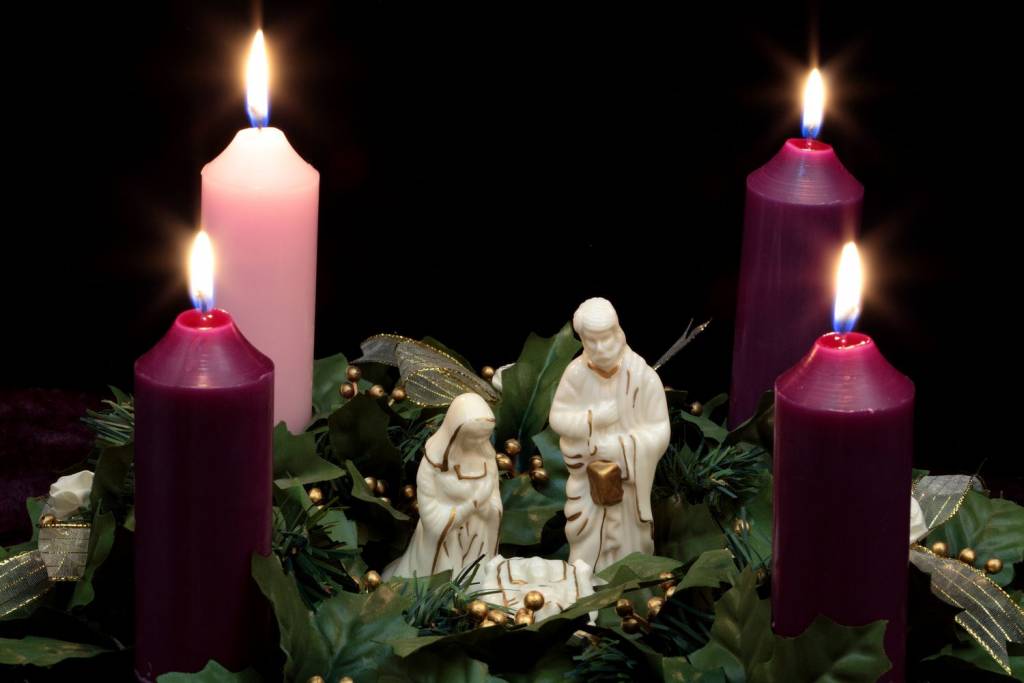Sunday, November 27, 2022
First Sunday of Advent Year A
First Reading: ISAIAH 2:1-5
Responsorial Psalm: PSALMS 122:1-9
Second Reading: ROMANS 13:11-14
Gospel: MATTHEW 24:37-44
Today is the first Sunday of Advent and the beginning of a new liturgical year. It always falls on the Sunday closest to the feast of St. Andrews (November 30) and the fourth Sunday before Christmas. It’s all about preparing for the coming of Christ. The Church gives us four weeks to prepare our hearts for Jesus. Today we light the first candle of our Advent writhe. Lighting candles on writhe at Advent is an ancient custom. Here in the Northern hemisphere, it is winter. And as the winter solstice approaches, it is getting colder and darker. So, the ancients, in the midst of the cold and darkness, fashioned circular writhes from the branches of the bush and place candles around them, praying as they lit the candles that the warmth and light of spring and summer would come swiftly. Jesus is the true light, the true sun that dispels darkness and warms our hearts. And so, in lighting our first candles, we also pray for the coming of the light, for Jesus the light of the world, that He may come and dispel the darkness of our world.
The four weeks of Advent represent the thousands of years the world awaited the coming of the Messiah. It was a period of darkness but not without hope. The prophets nourished the faith of the people of God with the hope of the Messiah. In the liturgical season of Advent, the Church re-lives without pretending that Christ has not come, this period of hope and expectation. She presents us with readings that sharpen our desire and spiritually prepare us for the coming of Christ.

Despite the sins of the people and the disastrous situation of Judah described in the first chapter of Isaiah, the second chapter which we begin today offers a glimmer of hope. It is a vision of messianic and eschatological restoration which shows that the salvation of the world remains centered on Zion, “the mountain of the Lord,” i.e., Jerusalem. All nations will converge on the Holy City not to despoil if of its wealth; they will come in peace to hearken to the Word of the Lord and receive instruction in His law. This note of hope at the beginning of Isaiah will be a recurrent theme throughout the Book and throughout Advent.
In contrast to the strife and desolation that sin brings in its wake as described in the first chapter of Isaiah, peace is the outcome of reverence for God and readiness to obey His precepts. Last Sunday we celebrated Christ the King. While instituting the Solemnity of Christ the King, Pope Pius XI noted that the chief causes of evil in the world; wars, violence and the difficulties under which mankind is labouring, is that majority of men had thrust Christ and His holy law out of their lives and it has no place whether in private affairs or in politics. And he said that as long as individuals and states refuse to submit to the rule of Christ and persist in carelessness towards the things of God, there would be no real hope of lasting peace among the nations.
The Gospel reading sketches man’s perennial insensitivity and carelessness towards the things of God. Man thinks it is more important to eat and drink, to find a husband or wife, or build a profitable business; but if this is your attitude, you are forgetting about the most important thing – eternal life. By using the metaphor of the great flood of Noah’s time, when men and women were eating and drinking, marrying and giving in marriage, and the flood took them by surprise, Jesus tells us that the Son of man’s second coming will happen unexpectedly, taking people by surprise, whether they are doing good or evil.
Two men will be out in the field; one is taken and one is left; two women will be grinding at the mill; one will be taken, and one will be left – it is in the context of the ordinary affairs of life like farming, housework etc. that God calls man; and man responds. It is there that his eternal happiness or eternal punishment is decided. The good news is that you don’t have to do anything special or fulfil special conditions: one simply has to be faithful to the Lord in the middle of ordinary everyday affairs. If your work is to sweep the road, you do so with diligence. If you are a teacher, you teach with diligence. That is what it means to be vigilant.
St. Paul tells us in the second reading that salvation is nearer to us than when we first believed; rising like the sun, Christ has dispelled darkness so that we may walk in the light, conducting ourselves as in the day and persevering in faithfulness to the Lord in ordinary everyday affairs. Reflect today on the call to be vigilant. You don’t have to accomplish great things for God. All that is required is diligence and faithfulness to God in our ordinary everyday activity so that whenever He comes, we may not be found wanting.
Happy Sunday

Rev. Fr. Chidi Onwuka m.ss.cc.
